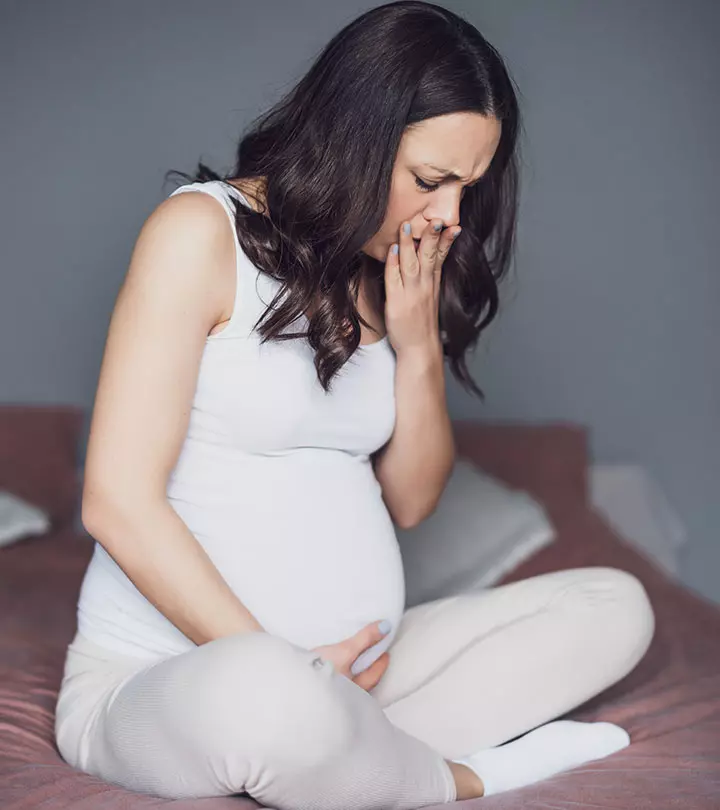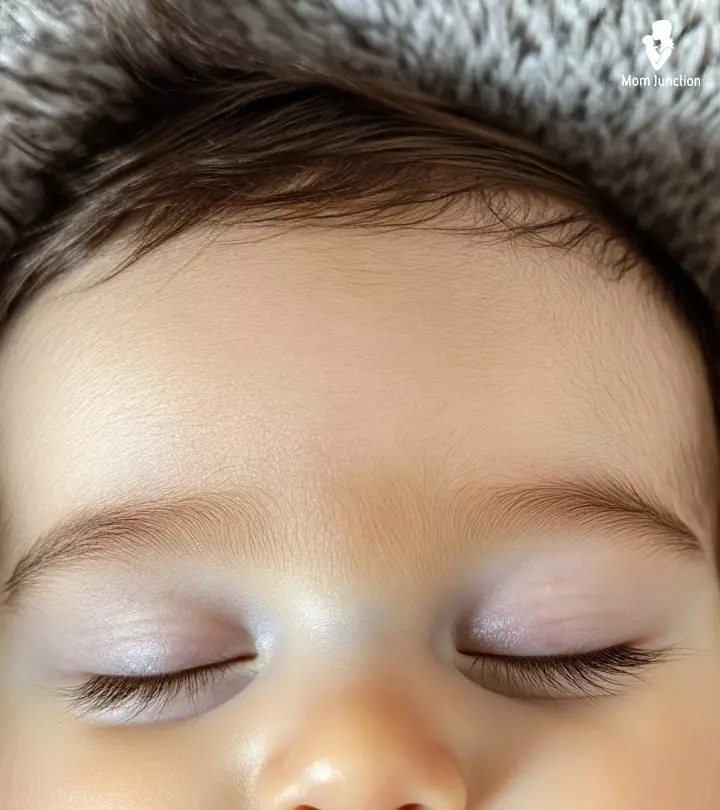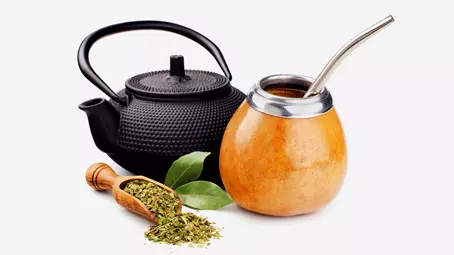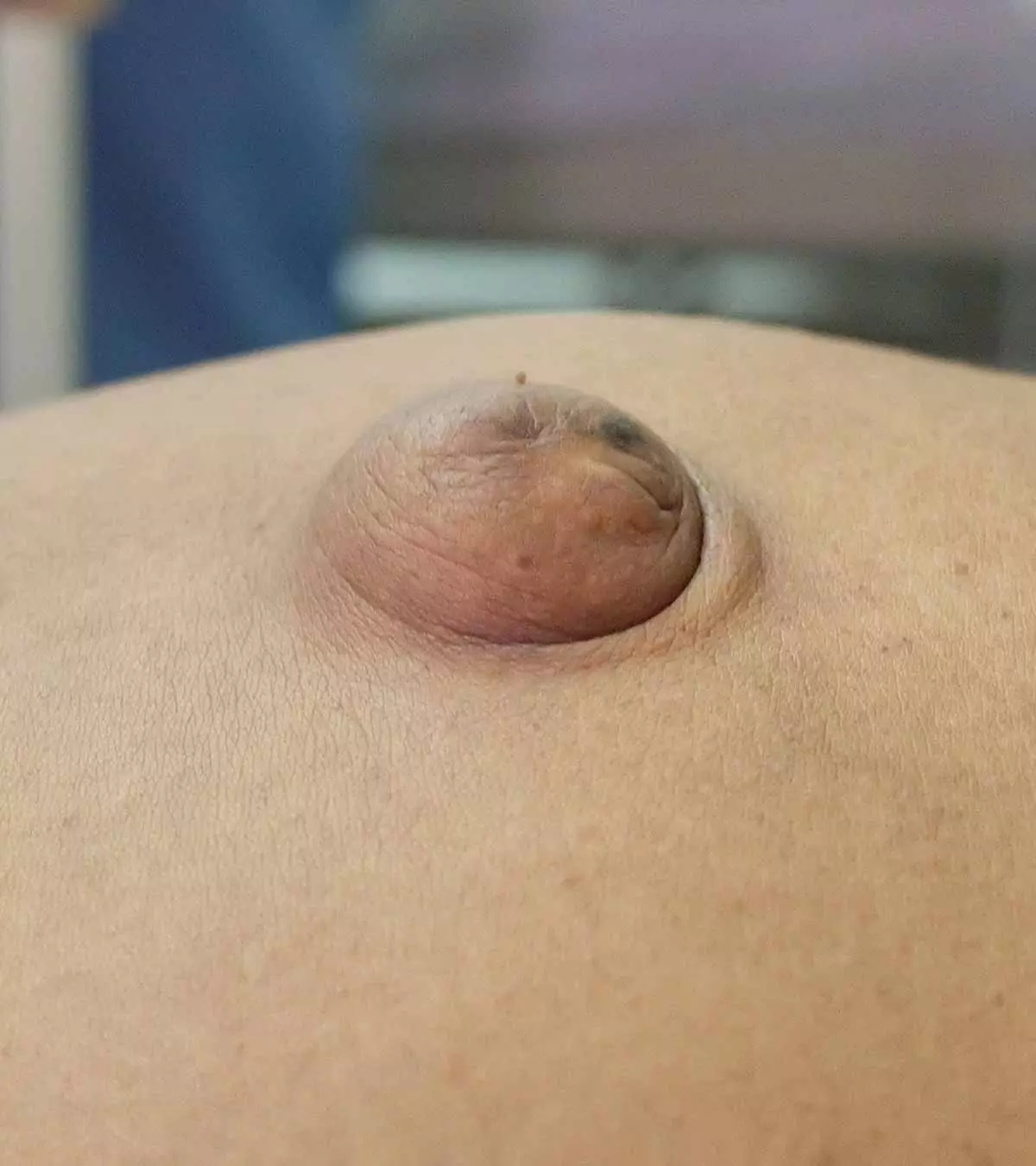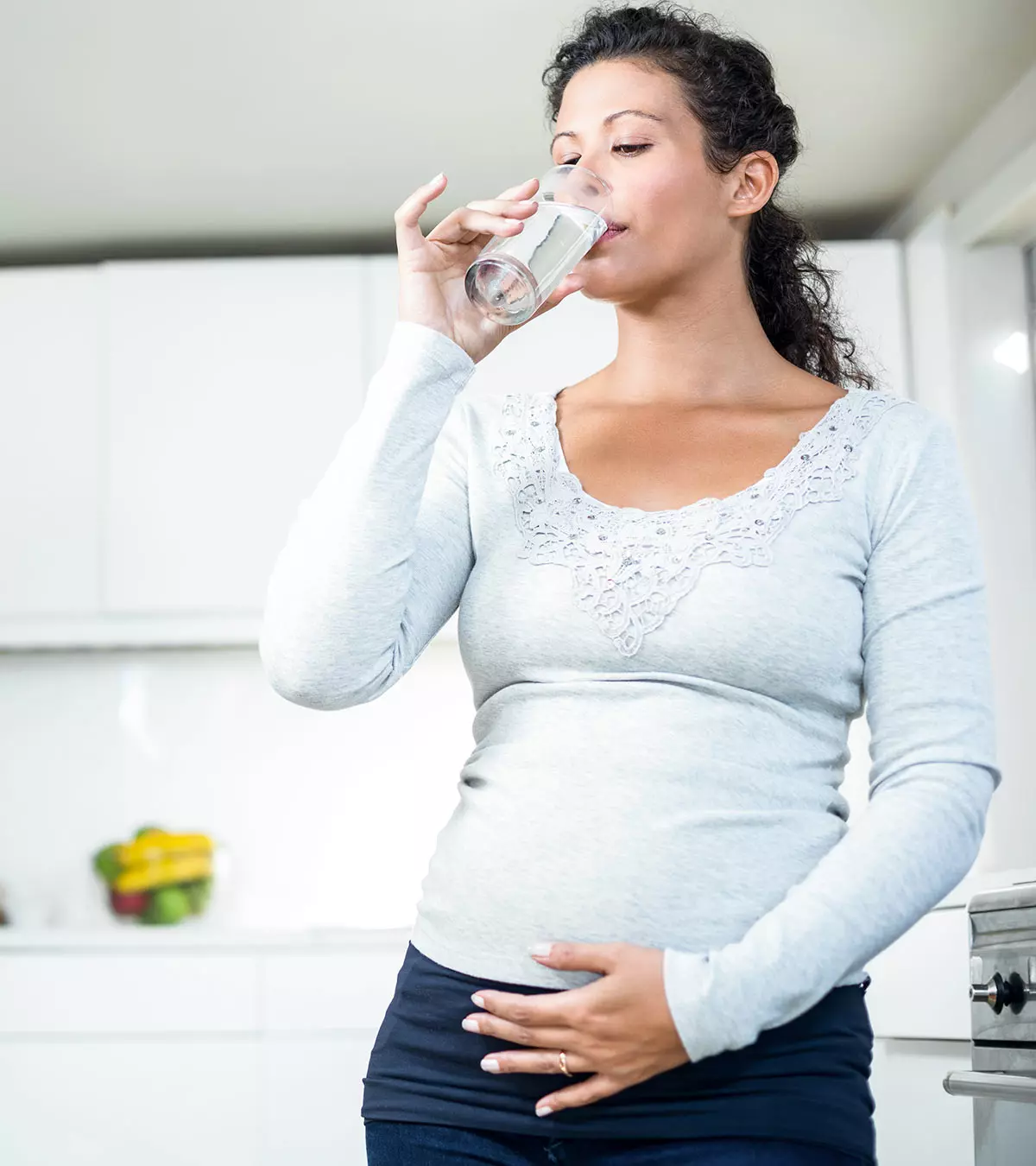
Image: ShutterStock

You may start experiencing the early symptoms of pregnancy one to two weeks after conception. Excessive thirst during pregnancy is one such symptom that occurs due to various physiological and biochemical changes in the body. It’s not uncommon for pregnant women to be thirsty all of the time, but knowing the typical hydration needs helps expectant mothers manage excessive thirst and consult healthcare providers as needed.
Read this post to learn more about extreme thirst during pregnancy, its causes, and how to deal with it.
Key Pointers
- Various bodily and physiological changes during pregnancy may lead to excessive thirst.
- Increasing water intake may help, but it’s important not to overhydrate.
- Monitoring water intake can help ensure that excessive thirst is not the result of an underlying health issue.
- Consuming non-alcoholic fluids such as coconut water, fruit juices, and fruits and vegetables high in water content can help hydrate the body.
- If excessive thirst seems irregular and is accompanied by other symptoms, it’s best to consult a doctor.
Is It Normal To Feel Extremely Thirsty During Pregnancy?
It is normal to feel intense thirst during pregnancy, especially in the first trimester, when you start to experience other symptoms. However, some women may have the urge to drink more water even during the second and third trimesters.
Sometimes, you may feel thirsty even after drinking enough water, which could make you wonder if all is well with your body. This feeling of excessive thirst could be managed once you know the reasons for it. Some pathological conditions, such as diabetes (marked by elevated blood sugar levels or hyperglycemia) and excessive vomiting, may make you thirsty.
Is Excessive Thirst An Early Sign Of Pregnancy?
Increased hunger and thirst can be among the early signs of pregnancy (1). However, your pregnancy cannot be confirmed based on these changes. Not every woman who is pregnant experiences increased thirst during the early stages of pregnancy. It’s essential to perform a home pregnancy test and further corroborate with a doctor to confirm pregnancy.
Samar Hu, a young mother and ardent blogger, talks about the joys and symptoms in the early stages of her pregnancy and says, “It was just — I just had this immediate extreme craving for food. Along with that, I was also a lot more thirsty. So my water intake almost doubled or tripled as well, and of course, that led to having to go to the bathroom more often (i).”
What Are The Causes Of Excessive Thirst During Pregnancy?
One of the primary reasons for feeling extremely thirsty is not drinking enough water. Other reasons for it could be:
- Fluid requirements: Adults need 1 to 1.5ml of water for every calorie taken. But during pregnancy, as the calorie consumption increases by 300, the water intake should also increase by 300 milliliters. When the recommended daily amount of water is not met, you could experience an intense thirst (2).
- Extra blood: During pregnancy, the volume of the blood increases to meet the oxygen requirements of the baby. The additional blood may require additional water intake. So even if you are drinking excess water, it is used up to make blood, and you might feel thirsty (3).
- Build new cells and tissues: Fluids do more than quench your thirst. Pregnant women require water to build new cells and tissues to support digestion, let out toxins, transport nutrients, and form amniotic fluid. The water you drink is used for all these and could leave you feeling thirsty again (3).
- Frequent urination: From the second trimester, the fetus starts growing, and the uterus expands. The pressure on the bladder makes you want to urinate often, leaving you drained and thirsty again. This could happen in the case of gestational diabetes as well.
- Low blood pressure: If you have low blood pressure, then you could experience unusual thirst and dehydration while you are pregnant. And if you fail to drink enough water, you might also experience dizziness (4).
- Diabetes insipidus: It is one of the rare conditions that might cause excessive thirst, along with polyuria, during pregnancy (5). A proper diagnosis of the condition by a medical professional could help detect and treat the condition.
Other than the above, intake of salty and spicy foods could make you intensely thirsty. Also, if you consume a lot of caffeinated beverages, you could feel dehydrated, parched, and thirsty.
What Other Symptoms Do You Experience With Excessive Thirst?
There could be various symptoms indicating that you need more water. Some of them include:
- Persistent dryness in the mouth and throat
- Swelling in hands and feet
- Frequent urination
- Tiredness
- Blurred vision and dizziness
- Leg pain
If you experience these symptoms, it is important that you take the necessary remedial steps.
Is Feeling Thirsty The Same As Becoming Dehydrated?
Excessive thirst could be an indicator of dehydration. When your body does not have enough water, it’s called dehydration. Feeling excessively thirsty is an indication that your body is asking for fluids. Some other signs of dehydration in pregnancy are headache, tiredness, and dizziness (6).
How To Deal With Extreme Thirst During Pregnancy?
Besides drinking plenty of water, you could do the following to manage excessive thirst during pregnancy to improve maternal health.
- Have more fruits and vegetables. This may increase the fluid content, improve fluid balance, and help you meet the nutritional requirements.
- You may have more sugar-free fruit juices and milk to meet the body’s need for fluids.
- You should limit the intake of salty or spicy foods and also avoid soda or caffeinated drinks for a safe and healthy pregnancy.
- Always keep a bottle of water with you, whether you are indoors or going outside.
- Drinking lemonade also helps in fulfilling the body’s needs for fluids during pregnancy.
- You may suck on your favorite popsicle or flavored ice to quench your thirst.
- You might get a water bottle with measurements on it. This could help regulate the fluid intake and prevent you from drinking beyond the requirements.
- Try a hydration app or journal to track daily water intake and meet your hydration goals.
 Quick tip
Quick tipIf you are unable to manage the condition through any of the above measures, and if the symptoms are not tolerable, consult a professional.
When Does It Become A Cause For Concern?
Watch your symptoms and understand your body’s requirements during pregnancy. This might help you know when to meet the doctor. You should contact the doctor:
- When you lose excess water from your body through frequent urination.
- If you are excessively thirsty even after drinking the required amounts of water.
- Intense thirst could be a sign of gestational diabetes, get it checked and treated accordingly.
- When there are clinical signs of dehydration, such as reduced blood pressure, increased pulse rate, ketotic breath, ketones in the urine, and reduced urine output.
In the next section, we answer some common questions related to thirst during pregnancy.
Frequently Asked Questions
1. Is it good to drink water at night during pregnancy?
It may not be harmful to drink water at night or before going to sleep. It is better to keep a bottle of water near your bed as you may get thirsty anytime during the night. However, the only thing that could trouble you in such a case is frequent trips to the bathroom.
2. Can drinking too much water result in too much amniotic fluid?
Drinking plenty of water might not result in too much amniotic fluid. However, it is best to drink water as per the requirements of your body and not more than the recommended volume. On the other hand, less water consumption causes a transient reduction in the amniotic fluid.
3. Does not drinking enough water cause miscarriage?
Not drinking enough water may not result in any severe pregnancy complications. But make sure to consult your doctor if you sense trouble with your body. Sometimes, food poisoning or dehydration can be harmful, needing hospitalization and parenteral fluid therapy.
4. Can hot water cause miscarriage?
Extremely hot water could burn your tongue, so try to have warm water instead. Warm water during pregnancy could be beneficial in many ways as it could detoxify your body, relieve constipation, hydrate your skin, and may help in better blood circulation.
5. Can excessive thirst during pregnancy harm the baby?
Excessive thirst itself does not cause any harm or problems to maternal and fetal health. It is the problems that lead to it, such as gestational diabetes, that can harm the baby if not treated properly (8).
6. Is it safe to drink sports drinks to quench excessive thirst during pregnancy?
No. Sports drinks or energy drinks usually contain caffeine and other additives, such as artificial sweeteners, which could harm maternal and fetal health (9).
7. Can excessive thirst during pregnancy be a sign of thyroid problems?
In rare cases, hyperthyroidism (excess thyroid hormones) during pregnancy is linked to hyperemesis gravidarum (severe nausea and vomiting). This may lead to dehydration, which may cause excessive thirst. If you sense your excessive thirst could be related to an underlying thyroid problem, speak to your doctor (10).
Although excessive thirst during pregnancy is not something to be worried about, you should know what is causing the symptom so that you can try to prevent any further complications. Keep drinking as much water as required and eat healthy to have a safe pregnancy.
Did you feel intense thirst during the early weeks of your pregnancy? Share your experiences with us in the comment section below.
Infographic: Water-Rich Foods To Include In Your Pregnancy Diet
Increased fluid intake during pregnancy is recommended to stay hydrated and avoid complications. So besides drinking glasses of water, you must eat as many water-rich foods as possible to keep up with the intake while taking in their nutritional benefits. Here are a few such fruits and veggies you can include in your pregnancy diet.
Some thing wrong with infographic shortcode. please verify shortcode syntax
Illustration: Excessive Thirst During Pregnancy: Causes Signs & Remedies
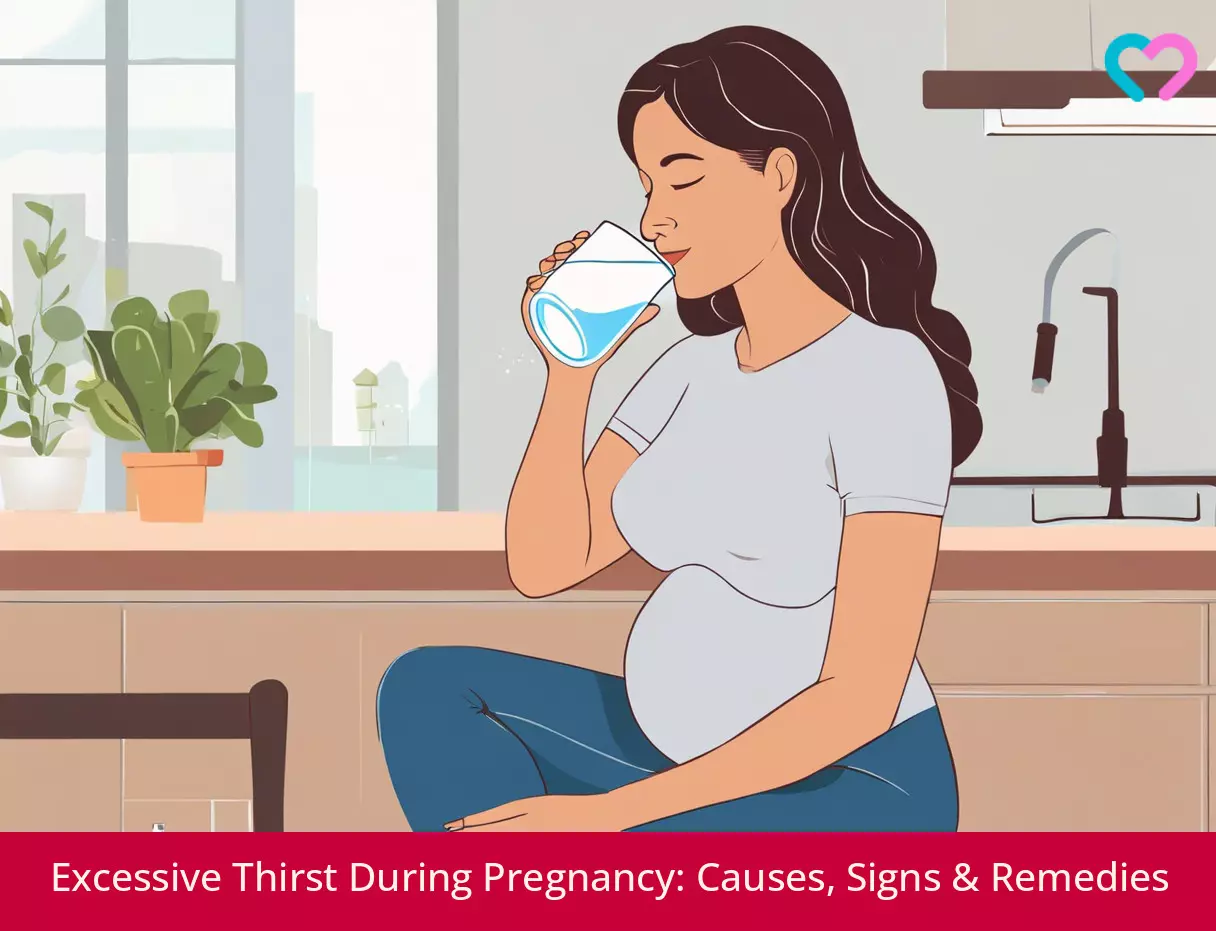
Image: Stable Diffusion/MomJunction Design Team
Personal Experience: Source
MomJunction articles include first-hand experiences to provide you with better insights through real-life narratives. Here are the sources of personal accounts referenced in this article.
i.3 weeks pregnant: early pregnancy symptoms before bfp;https://www.youtube.com/watch?feature=shared&v=U8rJvd2fJJY
References
- What are the early signs of pregnancy? – text version; Pregnancy Birth and Baby)
- K. S. Montgomery; Nutrition Column An Update on Water Needs during Pregnancy and Beyond; The Journal of Perinatal Education (2002)
- L. Cruz; How Hydration During Pregnancy Can Benefit You And Your Baby; Intermountain Health Care (2017)
- Low Blood Pressure – When Blood Pressure Is Too Low; American Heart Association
- M. Sum, J. B. Fleischer, A. G. Khandji, and S. L. Wardlaw; Pitfall in the Diagnosis of Diabetes Insipidus and Pregnancy; Case Reports in Obstetrics and Gynecology (2017)
- Cottage cheese, full fat, large or small curd, (2346384); Food Data Central; USDA
- Dehydration; Cleveland Clinic
- Gestational Diabetes; Food Data Central; Cleveland Clinic
- Caffeine During Pregnancy; Pregnancy Birth and Baby
- Thyroid disease and Pregnancy; National Institute of Diabetes and Digestive and Kidney Diseases
Community Experiences
Join the conversation and become a part of our nurturing community! Share your stories, experiences, and insights to connect with fellow parents.
Read full bio of Dr. Girija Wagh
Read full bio of Rebecca Malachi
Read full bio of Dr. Ritika Shah
Read full bio of Reshmi Das






